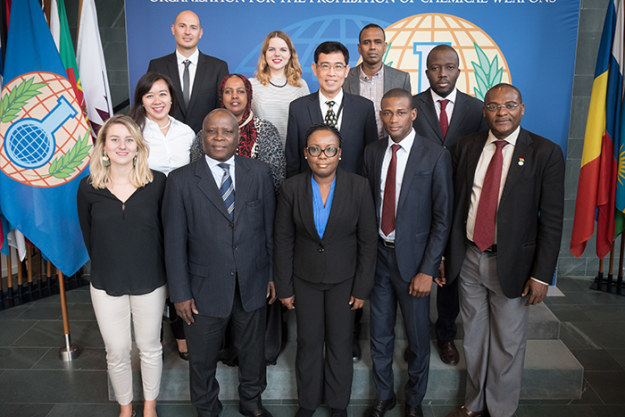
Participants from the Internship Programme for Legal Drafters and National Authority Representatives held in The Hague from 7 to 11 August
THE HAGUE, Netherlands — 31 August 2017 – Representatives of Benin, Djibouti and Ghana are better equipped in drafting national legislation for the implementation of the Chemical Weapons Convention (CWC), after participating in an Internship Programme for Legal Drafters and National Authority Representatives held in The Hague from 7 to 11 August 2017.
The Internship Programme, which was conducted by members of OPCW’s Technical Secretariat, enabled six participants from three countries to draft national legislation and to formulate a plan for its implementation.
A legal expert from Cameroon, Mr Patrick Endezoumou shared Cameroon’s experience in developing and adopting CWC national implementing legislation. Mr Endezoumou was also a facilitator for the drafting sessions.
The programme covered a wide range of topics, including: overview of the legal requirements under the CWC, legal issues in national implementation, initial and annual declarations to the OPCW, the role of the National Authority, and provisions in national implementing legislation to address chemical terrorism.
After the presentations about the CWC and drafting sessions, participants from each country submitted a comprehensive National Action Plan and a summary of its draft legislation. The plan comprised a timeline for the adoption of the CWC which would serve as reference for the Technical Secretariat.
Since its launch in 2012, the Internship Programme has benefited 35 States Parties. Among these, Cape Verde, Grenada, Panama, Paraguay and Uganda have successfully enacted national legislation, while others are at various stages of the adoption process.
Background
As the implementing body for the Chemical Weapons Convention, the OPCW oversees the global endeavour to permanently eliminate chemical weapons. Since the Convention’s entry into force in 1997 – with its 192 States Parties – it is the most successful disarmament treaty eliminating an entire class of weapons of mass destruction.
Ninety-five per cent of all chemical weapon stockpiles declared by possessor States have been destroyed under OPCW verification. For its extensive efforts in eliminating chemical weapons, the OPCW received the 2013 Nobel Prize for Peace.
